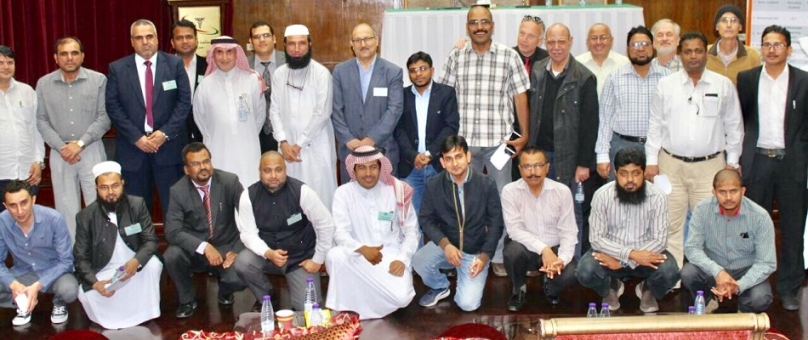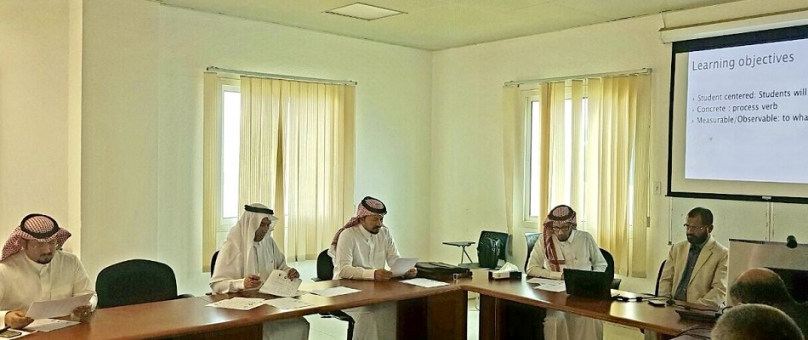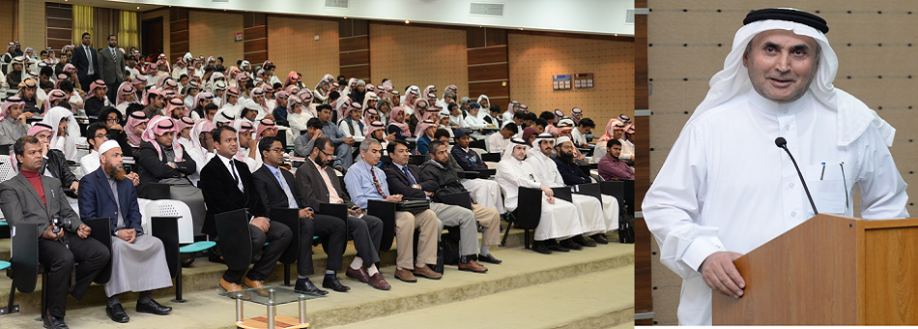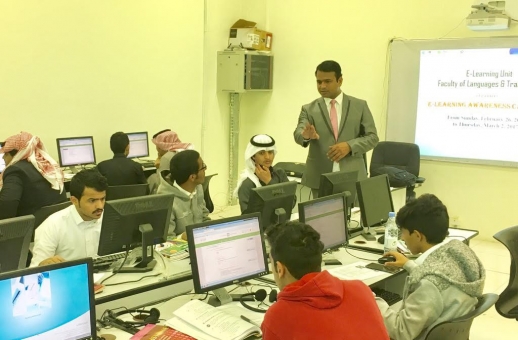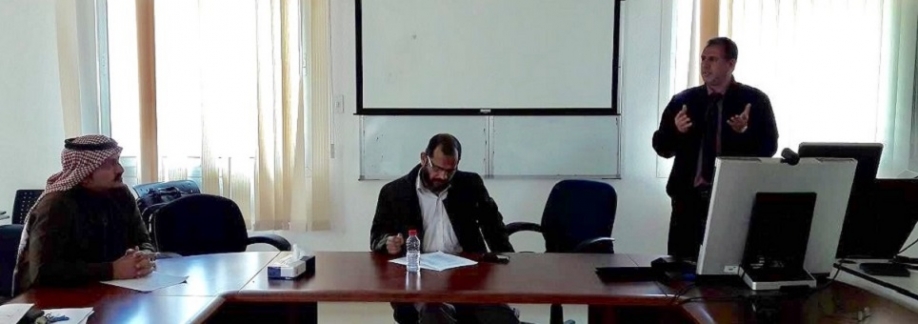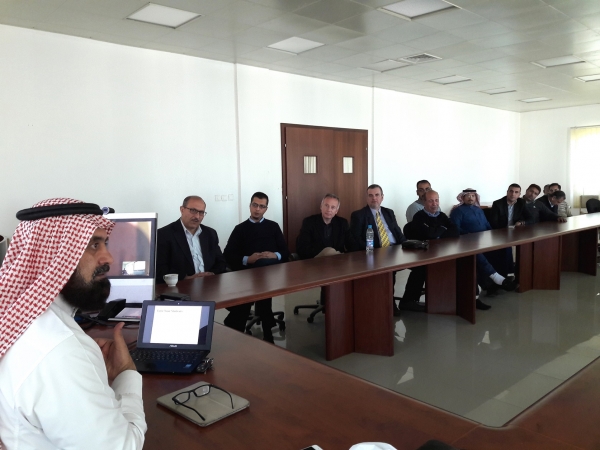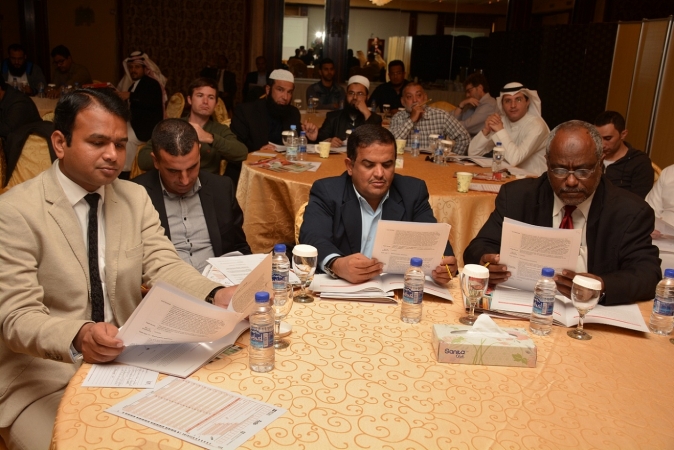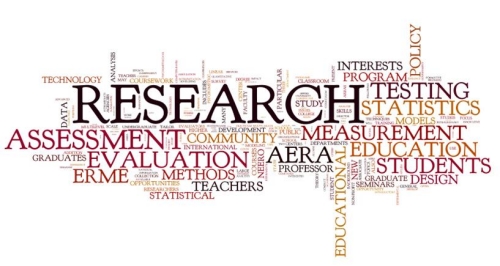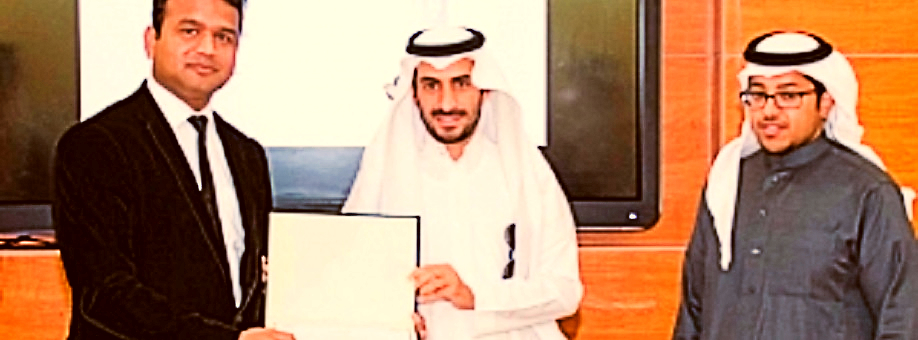News
The First Annual Forum on the English language titled Teaching English in the 21st Century was held on April 15, 2017, at Saudi German Hospital in Abha, Saudi Arabia. The forum was organized under the supervision of Dean, Dr. Abdullah Al Melhi, in cooperation with Quality Education Holding Company and Oxford University Press. The aim of the forum was to train language teachers for professional development that would emphasize the enhancement of teaching competence regarding classroom management, activities, and handling overall language teaching. The program included two training sessions and four presentations on English Language Teaching (ELT). The participants included both male and female faculty members working at King Khalid University.
The program began with a welcome speech by Dr. Abdullah Al Melhi. In his speech, he emphasized the significant value of holding Forums which aim to advance the field of ELT. He reiterated such importance by focusing on the fact that forums of this nature always bring beneficial changes in language teaching and help to discuss new teaching concepts. He suggested there be more frequent language forums in the future for professional development.
Terrie Craddock from Oxford University Press conducted two training sessions. In her first session, which was titled Motivating Students, she shared ideas about how to motivate language learners. During the session, the participants took part in an interactive discussion, where they exchanged their views on motivation. She highlighted different ways to make language tasks more interesting and engaging. Craddock’s second session, Differentiated Teaching and Learning, looked at dealing with groups of mixed abilities. Despite the challenges involved in handling diverse skill groups, she said, it is manageable if the teacher knows how to engage fast learners. She also highlighted the advantages and disadvantages of combining fast learners with slow ones. Overall, both the sessions were very interactive and informative.
What followed was Mohammad Adil’s presentation titled Exploitation and Adaptation in EFL Teaching. His presentation was based on a case study he had conducted on the usefulness of course materials used in skills and language courses. He pinpointed some issues associated with the use of published course materials. He emphasized that teacher’s creativity, control, and choice (McGrath 2013: 22-23) can make a difference. He showed how a boring or monotonous lesson could be changed into an interesting and engaging one if the teacher uses his or her creativity. Adil concluded that it is illogical to believe that the course books are useless and at the same time, it is not logical either to depend strictly on published course books while teaching. In his session, the participants also exchanged their valuable thoughts.
The next presenter was Dr. Eyhab Bader Eddin who spoke about Second Language Acquisition (SLA). His presentation titled Theoretical Approaches to Second Language Acquisition was primarily centered on theories about language learning and acquisition such as Krashen’s (1982) Monitor model, behaviorism, and innatism. During his session, he showed some funny movie clips to highlight challenges involved in language learning and acquisition. Dr. Eyhab, through these video clips, also wanted to highlight how a learner’s mother tongue influences second language learning. He concluded that SLA theories are closely related to their counterparts in the mother tongue. Also, prior knowledge of mother tongue, usually acquired from the parents, may or may not be an advantage depending on the similarities and differences between the pair languages in question.
Dr. Abdul Wahed Al Zumor’s presentation was centered on his study based on challenges encountered by King Khalid University Science faculty students, as a result of English Medium Instruction (EMI). The study revealed that the identified approach results in a failure in that it deteriorates lecture comprehension, understanding content, and communication with their instructors due to lack of adequate English proficiency. Dr. Al Zumor concluded that the additive bilingualism approach could enrich their learning environment. This presentation was worthwhile in that it successfully raised awareness among the participants of the drawbacks of English Medium Instruction (EMI) in teaching courses other than English.
Mohammad Sirajul Islam concluded the sessions by presenting about issues related to the use of e-learning. This was also based on a case study that aimed at investigating students’ attitude towards e-learning. Interestingly, students enrolled in language courses showed a positive attitude towards online learning. On the other hand, content course students’ attitude towards e-learning was negative. He pinpointed another crucial issue related to teachers’ expertise in using Blackboard. Many teachers fail to follow the rubrics while designing online courses. He concluded that there is a need for proper e-learning training for teachers so that they can enhance their expertise in teaching online.
In the end, there was a closing speech by Dr. Abdullah Al Melhi, who thanked the organizing committee for arranging such a program. He congratulated those who had worked behind the scenes to make the forum a real success.
We would like to recognize the following organizing committee members for their efforts in this event:
Dr. Mwafaq Momani
Mr. Javed Ahmed
Mr. Mohsin Raza Khan
Mr. MD Sirajul Islam
Mr. Saleh Hokash
Mr. Naser Alhawamdeh
Mr. Mazharul Islam
Date: 04-17-2017
Source: MD Adil
Multimedia Contribution: MD Sirajul Islam
On Monday, March 27, 2017, the Language Research Centre, under the supervision of Dr. Ismail Al Refaai, held a seminar. Dr. Haseeb Ahmed talked about the importance of literature in English Language Teaching and Learning. His presentation was titled, What is Literature? Why Should we Study it?
Dr. Ahmed emphasized the importance of studying literature. During his presentation, he quoted preeminent poets such as Shakespeare, Wordsworth, Sidney, and philosophers like Aristotle and Jean Paul to identify the purpose of literature. Some of them termed literature as a source of delight and pleasure, and some termed literature as a tool serving a political purpose.
Dr. Ahmed concluded that literature helps to express oneself, have access to culture, develop sophisticated sensibility, appreciate beauty, and develop a wider perspective of events.
It is worth noting that Al Samer Campus also participated in the seminar through video conferencing. The presentation was worthwhile and engaged the participants on both sides with an interactive discussion.
Date: 03-27-2017
Source: MD Adil
Multimedia Contribution: MD Sirajul Islam
On Monday, March 13, 2017, Dr. Sheila Simpkins talked about the importance of Bloom’s Taxonomy in a seminar organized by the Language Research Centre held at the Al Samer Campus. Her Presentation was titled Bloom’s Taxonomy: An Effective Tool for Language Teaching.
Dr. Simpkins' presentation was centered on the revised version of Bloom’s Taxonomy. She emphasized the proper application of Bloom’s taxonomy in pedagogy and designing lessons. She related that learning objectives should be student-centered, concrete and measurable. Appropriate use of process verbs could make learning objectives concrete, she added. She also allowed the participants to discuss freely how Bloom’s taxonomy could be incorporated into teaching and lesson planning.
She, while talking about the proper application of Bloom’s Taxonomy, pinpointed some major issues associated with education; one of which was excessive teacher talk time (TTT). She asserted excessive TTT as a primary indicator of a teacher-centered classroom where learners play a passive role most of the time. She put emphasis on learner-centered teaching where students are fully involved in the learning process.
The presenter concluded that proper application of Bloom’s Taxonomy helps to create effective lessons that make students retain information longer, enhances critical thinking and engages students successfully in the learning process.
It is worth mentioning that Gregor campus also participated in the seminar through video conferencing.
The presentation was worthwhile and raised awareness in regards to lesson effectiveness among faculty members.
Date: 03-17-2017
Source: MD Adil
Multimedia Contribution: MD Sirajul Islam
In cooperation with the Deanship of Community Service and Continuing Education and under the supervision of Dr. Abdullah Al Melhi, Dean, and represented by Dr. Eyhab A. Bader Eddin, Lecturer, an 18-hour short course titled "Introduction to General Translation" that ended on March 8, 2017, was delivered by the Faculty of Languages and Translation (FLT). The course took place in the Al Qimma room, on the 2nd floor of Building 4, Deanship of Community Service and Continuing Education. Dr. Abdullah Al Melhi asserted that tailored, in-depth short courses aligned with market demand provide invaluable knowledge acquisition opportunities.
The trainees were mainly English teachers from the Ministry of Education. Some trainees were from the military sector while a few were from the Ministry of Health. The course was given by Dr. Eyhab A. Bader Eddin, a qualified expert in translation with prior first-hand experience in the European Union and United Nations. The trainer broke down the essential components of translation for the trainees so as to simplify things. He kicked off the course with a brief historical overview of translation, moving to the core elements making up translation. The first session saw an introduction to the general characteristic features of English and Arabic statements. Such issues as syntactic mismatch in both languages were touched upon, trying to find some strategies to overcome inherent problems that are puzzling. Session 2 saw how the linguistic phenomena of hyponymy and homonymy in translation are crucial to understanding. An in-depth review of specific issues in lexical semantics occurred in a bid to broaden the reflections of the trainees. The stylistic features of headlines were introduced, adducing evidence from official newspapers. Relevant pie charts were displayed to illustrate the frequency omission of articles occurs. Attempts were made to translate many headlines in both languages, discussing some important issues of what made a good translation and what spoiled it. Simple translation quality assessment techniques were reviewed. An assignment wrapped up session 2. Session 3 discussed the translation of non-finite clauses, and if-conditional in both languages, demonstrating the resulting nuances of meaning.
The remaining sessions were devoted to translating short texts, ranging from journalistic, political, and scientific to literary text types. Some time was spent on working out translation problems when dealing with idiomatic expressions and proverbs. Cultural gestalt was copious in the two languages. An assignment was distributed every week to ensure they had understood the topics discussed. Assignments were corrected and returned to ensure students remained actively engaged and committed to improving. Anonymous individual feedback for use in future courses occurred via an evaluation form. The course sun sank with a ceremony during which attendance certificates were distributed to the trainees who attended at least 80% of the entire course. Dr. Mubarak Al Hamdan, Dean of Community Service, and Dr. Abdullah Al Melhi participated in the closing ceremony and handed over the certificates, wishing all the best of luck.
This is what some participants (anonymous) had to say about the course.
“Active learning has been seen in an interesting environment. Teaching has been conducted in a way that comforts students or learners and attracts them."
"An excellent course, I hope that it continues for several times so that we can benefit from it."
"First thank you so much for this great course. This course changed my ways in translation."
View Lecture 1 by clicking here.
Date: 03-10-2017
Source: Faculty of Languages and Translation
Multimedia Contribution: Anas Al Sharani, FLT Student
Under the supervision of Dr. Abdullah Al-Melhi, Dean, the E-Learning Unit organized a felicitation ceremony for the “E-Learning Awareness Campaign” on March 7, 2017, at 11:00 am in Auditorium 10, Building B. A large number of students attended the ceremony.
Dr. Abdullah Al Melhi announced the winners of the e-Quiz competition and awarded them with prizes and certificates. Turki Muhammed Al-Shamakh won first place while Saleh Bin Ebrahim Hamdan Al-Hufayan and Ahmed Mohammed Haj received the second and the third prizes respectively. Mahdi Bin Amin Al-Musabi and Khalid Bin Muhammed Al-Qahtani won the consolation prizes.
Dr. Abdullah Al-Melhi congratulated the students on their achievement and said, “E-Learning is vital to the academic growth of students. It helps them to enhance their language skills.”
Dr. Muhammed S. Assiri, Vice Dean for Academic Development & Quality, extended his sincere appreciation to the E-Learning Unit and its team for organizing the awareness campaign.
Mr. Mohsin Raza Khan, E-Learning Unit Supervisor, welcomed the dignitaries and presented a brief introduction of the activities carried out during the E-Learning Awareness Campaign.
On this occasion, Dr. Abdullah Al-Melhi presented certificates of appreciation to Dr. Khalid Al-Mohanna, Mr. Abdullah Al-Zubain and other representatives of E-Learning Deanship for their support to the campaign.
In conclusion, the Dean gave Dr. Muhammed S. Assiri, Dr. Mohammed Asif (Campaign Coordinator), Mr. Mathew Paul, Mr. Mohsin Raza Khan, Mr. Javed Ahmed and Mr. Mazaharul Islam certificates of appreciation for successfully organizing the campaign.
Date: 03-09-2017
Source: E-Learning Unit
Multimedia Contribution: MD Sirajul Islam
Under the supervision of Dr. Abdullah Al Melhi, Dean, and represented by Dr. Abdulkhaleq Al Qahtani, Vice Dean of Higher Studies, the English Club held an orientation for all first level students on March 5, 2017. Dr. Abdulkhaleq Al Qahtani, Dr. Mohammed Assiri, Vice Dean of Academic Development and Quality, Dr. Munassir Alhamami, Chair of the English Department, Dr. Basim Kanaan, Academic Advisor, and Hassan Asiri, Director of Student Activities, presented the program. They all stressed critical points to success that included but were not limited to, helpful resources, policies, and general strategies. Dr. Abdulkhaleq Al Qahtani added that the purpose of the orientation program was to engage students and to introduce them to campus resources and opportunities. He further reasoned that a successful transition for students from their previous environment into the Faculty of Languages and Translation (FLT) is paramount.
This year’s orientation leaders were eager to share their experiences.
"Orientation is the next step for students in joining the KKU FLT community," said Hassan Asiri, Director of Student Activities.
“It was an opportunity to meet new students. For many of them, this was a great chance to ask questions,” said Haitham Hawi, President of the English Club.
Ahmed Al Otaibi, Vice President of the English Club, remembers going through the orientation program when he first started and learned how to get involved.
“I like providing assistance where it is needed,” Al Otaibi said. “Also, I wanted to let new students know about the English Club so that they can join us.”
In conclusion, Dr. Abdulkhaleq Al Qahtani emphasized the importance of orientation as being key to student success. He further reiterated that we aim to support the student experience inside and outside of the classroom.
Date: 03-06-2017
Source: Faculty of Languages and Translation
Multimedia Contribution: MD Sirajul Islam
Under the supervision of Dr. Abdullah Al Melhi, Dean, the E-Learning Unit of the faculty organized an “E-Learning Awareness Campaign” for level 1 department and ELC students from Sunday, February 26, 2017, to Thursday, March 2, 2017.
Dr. Mohammed S. Assiri, Vice Dean for Academic Development & Quality, appreciated the efforts of the E-Learning Unit for organizing the campaign and maintained that these kinds of activities help students in attaining academic excellence.
Mr. Mohsin Raza Khan, FLT E-Learning Unit Supervisor, said that the aim of the awareness campaign was to make new students aware of the necessity and practical use of the King Khalid University E-Learning learning management system (Blackboard). “This campaign had many objectives. However, we hoped that it served to lower anxiety, increase awareness of the need for students to self-monitor, and encourage student collaboration,” said Mr. Khan. Furthermore, Dr. Mohammed Asif Ishfaq, Campaign Coordinator, stated, "The Campaign encouraged students to use Blackboard effectively. We were excited that students actively participated in the campaign."
During the campaign, the E-Learning Unit carried out the following activities:
Imparted Blackboard training to students individually in their classroom,
Organized workshops for students in the e-learning labs,
Organized an e-quiz competition for students
Set up an e-learning booth and distributed brochures and booklets.
Mr. Abdullah Al Rezgi, Director of the English Language Centre, Dr. Munassir Alhamami, Chairman of the English Department, Mr. Abdullah Al-Zubain, E-Learning Specialist, Dr. Khaled Mohanna, E-Learning Team Manager, and all Level 1 teachers helped to make this awareness campaign a great success.
The Faculty of Languages and Translation offers a round of applause to the following individuals for their significant contributions and involvement:
Dr. Mohamed Asif Ishfaq, Coordinator of the Campaign
Mr. Matthew Paul, Level 1 Instructor
Mr. Jawed Ahmed, ELC General Coordinator
Mr. Mazaharul Islam, ELC Lecturer
The felicitation ceremony for awarding the winners of the e-Quiz competition will be organized on Tuesday, March 7, 2017.
Date: 03-02-2017
Source: Faculty of Languages and Translation
Multimedia Contribution: Jawed Ahmed
The Language Research Center at the Faculty of Languages and Translation organized a seminar on February 27, 2017, which included a presentation by Dr. Basim Kanan, titled The Effect of Expansion of Vision Span on Reading Speed. This presentation was based on a research study conducted by Dr. Basim Kanan, Salahud Din Abdul-Rab and Ahlullah Siddiqui.
It primarily emphasized the enhancement of reading speed. He pointed out the fact that reading comprehension is an important process that enables a reader to recognize symbols and understand the message. It showed the relation between eyes pauses and reading speed. Dr. Basim explained the terms reading span or visual span and eye-span. He demonstrated how a language learner gradually improves his or her reading speed from letter level to sentence level. The research study had also involved some training for KKU students to improve their reading speed. It had shown noticeable improvement in reading speed among the learners after training. He concluded that the average reading speed of KKU EFL undergraduate students is 75 wpm with approximately 70% comprehension.
The session was very interactive and informative. It is worth mentioning that Al Samer campus also joined the seminar through video conferencing.
Date: 2/27/2017
Source: MD Adil
Multimedia Contribution: Sayed Karim
On Monday, February 13, 2017, Hassan Costello and Professor Habib Abdesslem held a seminar titled, "Introductions in Locally Published Research Articles in Linguistics: Towards a Syntagmatics of Moves," organized by the Language Research Center of the Faculty of Languages and Translation. The presentation drew an analogy between the histories of traditional grammars and Swales’ rhetorical model for Research Papers Introductions. It argued that though core grammar rules for the sentence and core rhetorical patterns for the Introduction have originated from description and have risen to the status of prescription, the study of language use in different contexts can consolidate the core grammar rules and the core rhetorical patterns without undermining variation and change. The presentation applied Swales’ Create-a-Research-Space-Model (CARS) to describe the rhetorical patterns of Research Articles Introductions in linguistics published by two University journals in the Kingdom of Saudi Arabia. It offered representations of the sequencing of Moves in core and extended Move patterns. It was recommended that writers realize the three Moves in the order Swales presents them.
The Q&A session (King Abdullah Road Campus joined via teleconferencing) was vivacious, offering participants every opportunity to question the presenters and develop ideas. It is worth mentioning that Dr. Abdulkhaleq Al Qahtani, Vice Dean of Higher Studies, provided insightful input and recommendations for further study based on his astute Doctoral Dissertation at Oklahoma State University.
The presenters of this seminar would like to express their profound gratitude to Dr. Abdullah Al Melhi, Dean, and Dr. Ismail Al Refaai, Director of the Language Research Center & MA Programs Coordinator, for their continuous support and encouragement.
Please direct any correspondence concerning this particular seminar to habdessalem@kku.edu.sa or hscostello@kku.edu.sa. This study will be published in the Arab Journal of Applied Linguistics (AJAL) shortly and will be available on eprints.kku.edu.sa for further review at that time.
Date: 2/13/2017
Source: MD Adil
Multimedia Contribution: Sayed Karim
Summary
The IT Department of King Khalid University is pleased to announce the development of ePrints KKU. This new system is a digital research repository that is available to all faculty members in all departments. ePrints KKU will increase our faculty’s exposure in their respective fields and maximize the university’s impact on academia worldwide.
What is ePrints?
ePrints KKU is a research repository based on cutting-edge technology. The ePrints system allows university faculty to upload and share their publications for online research and re-use. The original version of ePrints was designed and developed by the School of Electronics and Computer Science at the University of Southampton (SOTON). The latest version of the program (ePrints 3) is a joint development project by SOTON in cooperation with King Khalid University (KKU).
Why ePrints?
A research repository is part of every advanced university’s critical digital infrastructure. The research repository provides for storage of and easy access to the digital content of the institution. This lowers document distribution barriers, allowing for increased use of the information by faculty and outside researchers. Leading universities worldwide have built robust repositories to improve ranking, quality, and enhance the ability to leverage human capital. See Gibbons (2004). ePrints KKU will showcase our capabilities and increase the university’s participation in the expansion and development of relevant academic fields. Also, ePrints KKU is a critical component of achieving the higher educational goals outlined in the Kingdom’s Vision 2030 national transformation program.
In reference to ePrints Dr. Salem Aleyani, CIO, states, "These efforts are for the sake of the homeland in general and for King Khalid University in particular towards achieving Vision 2030." Additionally, Abdulrahman Ibrahim, Software Engineer, asserts that the citation count of articles published by KKU staff will rise, and therefore, the cumulative impact of KKU will increase. The Deanship of Scientific Research further relates that only with complete ePrints cooperation of faculty members, will we be able to meet the National Commission for Academic Accreditation and Assessment (NCAAA) valuation of General Standard 10 (Research) and its subsequent Key Performance Indicators.
How Does ePrints Work?
ePrints interfaces in conjunction with Google Scholar. Primarily, Google Scholar indexes websites with scholarly articles by utilizing software known as crawlers and includes them in search results. Moreover, an automated software program, "parsers," indexes the bibliographic and reference data of the publications. ePrints is structured in such a way that allows for optimal crawling and indexing by Google Scholar thereby contributing towards extending the range of knowledge sharing (Yeates, 2003).
Get Involved
We encourage you to visit eprints.kku.edu.sa to upload your previous publications and utilize ePrints for all future endeavors. Please direct any correspondence concerning this specific repository to eprints@kku.edu.sa.
Date: 2/1/2017
Contributors: Hassan Costello and Dr. Charles Forman
References
Gibbons, S. (2004). Establishing an Institutional Repository. Library Technology Reports, 40(4), July-August 2004.
Yeates, R. (2003). Over the Horizon: Institutional Repositories. VINE: The Journal of Information and Knowledge Management Systems, 33(2), 96-99.
The English Club provided a platform for a structured, intelligent, and open debate in the month of December 2016. The purpose of the debate (Social Media Celebrities) was to build critical thinking, communication, collaboration, and creativity. Overall, many of those who attended in the audience applauded the civic awareness and engagement displayed by the debaters. First place winner, Khalid Al Shehri (against the motion), stated “We live in a world which relies on the online world more than the reality. We need more role models, but a role model may exert a bad influence. We need to be aware of that and keep that in mind.” Second place winner, Yasser Al Shahrani (for the motion), stated “Social media celebrities are like a mirror with two sides. If it is clean, it will reflect something good and vice versa.” Prof. Habib Abdesslem and Dr. Omer Sultan were the judges of the event and applauded the students for their persuasive arguments, fluency, and overall accuracy. Abdullah Asiri, Director of Student Activities, congratulated all students who participated in recent developments and looks forward to seeing the English Club host more in the upcoming semester.
Awards were also presented to the winners of the essay contest by evaluators Abdullah Asiri, Hassan Costello, and Saiful Islam as follows:
1st Place: Omar Muhammad Jama
2nd Place: Khalid Al Qahtani
3rd Place: Khalid Al Shehri
Special thanks to Abdullah Qahtani (Event Moderator), Mohammed Salem Shehri (Event Host), all members of the English Club, and Naif Musfer Bassami for developing a pilot Android/iPhone app.
Date: 1/8/17
Source: Faculty of Languages and Translation
Multimedia Contribution: MD Sirajul Islam
The E-Learning Unit of the Faculty of Languages and Translation (FLT), organized a one-day Final Grades & Grade Entry workshop for all new teaching staff. E-Learning Supervisor Mohsin Khan conducted the workshop. It aimed to coach and orient newly appointed staff of the FLT on the institutional policies and procedures surrounding final grades submission within the registration website. Many topics were covered, namely:
Final Grades & Grade Entry
When are final grades due?
How and when can students view their grades?
Where to go for help
Dr. Munassir Alhamami, English Department Chair, and Mr. Jawed Ahmed, General Coordinator of the ELC, provided holistic support.
Date: 12/29/2016
Source: Faculty of Languages and Translation
On Monday, December 19, 2016, Professor Abdullah Hadi Al Qahtani had a presentation titled Teaching as an Experience in a seminar organized by the Language Research Center of the Faculty of Languages and Translation. It was more an interactive session than merely a talk which covered some fascinating stories related to his and some others’ teaching and learning experience.
Prof. Al Qahtani began his discussion by raising a question about teachers who influenced the participants most. Some of the participants shared their experience on how their teachers had changed them. Prof. Al Qahtani emphasized that a teacher can influence and change the students by his or her behavior. He gave more importance to influencing than controlling the learners as a teacher. He also shared some interesting stories about some teachers and students that exemplified how knowledge, skills, values and love could be combined to play the role of a teacher in the real sense.
Apart from explaining the essence of true teaching, Dr. Al Qahtani talked about how he incorporated new technology into his teaching. He, while teaching how to give speeches in a course called Speech Workshop, successfully engaged his students in doing assignments through the Facebook.
He concluded that the idea a teacher only has to teach is now obsolete. The teacher has no longer a dominating role in class. It is not just the teacher who is supposed to transfer knowledge into learner’s brain. On the contrary, students can play a significant role in contributing substantially to the learning environment in class.
It is worth mentioning that Al Samer campus also participated in the seminar through video conferencing.
The session was very engaging and entertaining and overall a success.
Date: 12/19/2016
Source: MD Adil
The British Council in Saudi Arabia organized an IELTS Train the Trainer workshop for King Khalid University on the 16th and 17th of December. The two-day workshop was held for the staff of the College of Languages and Translation. Lucy McClay, Trainer, administered the workshop and covered not only the four testing skills of listening, speaking, reading, and writing, but also included test knowledge alongside in-depth training on how to administer mock tests and calculate approximate band scores. Abdul Rauf Khan, Head of the IELTS Testing Center at KKU, said, "This is beginning of an excellent liaison between the British Council and KKU which I hope will be a long-term collaboration." Participants of the event left feeling that:
§ The event was useful for professional development.
§ It helped to increase awareness of the challenges that students face when preparing and planning for the IELTS Academic and General Tests.
§ Overall confidence about teaching the IELTS exam preparation classes to students increased.
Dr. Abdullah Al Melhi Dean, said, "The workshop was a great professional development opportunity which was collaborative in nature and connected to improving student learning outcomes."
The workshop was stimulating and left all who attended engaged intellectually and ready to make a difference.
Date: 12/17/2016
Source: Faculty of Languages and Translation
Multimedia Contribution: Sayed Karim
Dear Colleagues
It is our great pleasure to inform you that the Language Research Center, Faculty of Languages and Translation welcomes submission of abstracts (no more than 250 words) for the 12th Research Day to be held on Thursday, 23/07/1438 H (20/04/2017)
Your paper should focus on the following areas:
ü Language teaching, learning, and acquisition in general
ü Technology-enhanced learning and teaching
ü Learner-centered teaching
ü Bilingualism, code-mixing and code-switching
ü Translation Studies
ü Literature in language teaching
Please send your abstract to lrc.seminar.kku@gmail.com no later than 14/4/1438 (12 January 2017)
We are eagerly looking forward to your response.
Dr. Ismail AlRefaai
Director, Language Research Center
On Monday, December 12, 2016, Mr. Erich Beer presented a talk on Reading Comprehension in the seminar series presented by the Language Research Center of the Faculty of Languages and Translation. The talk was titled: "From the top of a pole 100 feet high, how do you step forward? Questions, Intuitions, and pointers relating to Reading Comprehension."
Mr. Beer started by explaining the intriguing title and then proceeded to share the result of a poll he had conducted. Two groups had been surveyed: male English teachers teaching in the faculty (Graiger and Mahala campuses) as well as graduating male students (Graiger). The two groups had been given the same questions except for one question which was only applicable to teachers. The questions dealt with reading habits and views regarding the teaching of reading comprehension respectively.
Mr. Beer compared and contrasted the responses from the two groups for the information of the audience. Sometimes the views of the groups compared favorably, and at times they were widely divergent. The presentation was followed by a lively question-and-answer session. The session ended with two gift vouchers being given away to the first two members of the audience who could answer a competition question correctly. It was an engaging and thought-provoking presentation enjoyed by those present.
Mr. Beer's Appraisal
He writes: "The presentation (material) itself did not tie all the loose ends together, and there wasn't a proper interpretation of the survey result. Also, the preamble was disproportionately long. There were, however, several thought-provoking ideas that could be pursued, and a few innovations besides. I am an artist, not a scientist - I love (creative) ideas and get deliciously overwhelmed by them. They are like the contents of Pandora's box let loose - I simply can't nicely and neatly box them in, so I just let them be. Overall, I think, it was an engaging presentation, even somewhat entertaining."
Date: 12/12/2016
Source: MD Adil
Multimedia contribution: MD Sirajul Islam
A university-wide Blackboard training webinar was held by E-Learning Supervisor at the Faculty of Languages & Translation, Mohsin Khan, on Sunday, December 11, 2016. The webinar was organized by the E-Learning Deanship. It took place as part of a university-wide strategy to increase the amount of instructional design training to enhance the virtual learning environment for both students and teachers alike. The primary objectives of the webinar were to improve student learning, engagement, interaction, and most importantly quality learning. These objectives were solidified by the core foundation of the program that participants would be expected to be able to:
Create content items to present a variety of learning activities to enhance student learning;
Deliver authentic assessments to evaluate student knowledge in a variety of meaningful ways;
Effectively utilize select collaboration tools to increase student engagement by providing a means to share and create knowledge.
The webinar was an overall success and will continue successively in future webinars as a part of the Tamkeen Team efforts. Special thanks to E-learning Deanship Training Manager, Mohammed Jarallah, and ELC General Coordinator, Javed Ahmad, for their holistic support.
Update: Mr. Mohsin Raza Khan received a certificate of appreciation for his efforts at the beginning of the Spring 2017 Semester. The certificate was presented to Mr. Khan by the E-Learning Deanship.
Date: 12/11/16
Source: Faculty of Languages and Translation
Multimedia Contribution: Javed Ahmad
Dr. Abdul Wahed Al Zumor spoke about the improvement of lecture comprehension in content courses in the English department curriculum at a seminar organized by the Language Research Center of King Khalid University held on November 28, 2016. In his presentation, which was titled A Metacognitive and Social Strategy to Improve Content Lecture Comprehension, he highlighted a recently completed research project he had conducted on how content lectures can be made more comprehensible to learners.
He first showed the distinction between direct and indirect strategies, the latter of which involves metacognitive and social strategies. He, while pinpointing some fundamental issues related to learning and teaching at the Faculty of Languages and Translation that requires proper investigation, showed student grade statistics, problems associated with comprehending lectures, and challenges involved relating to students’ perspective. Through his research study, he illustrated remarkable results that showed students’ attitude towards content lectures, problems with teachers and teaching, and learners’ lack of background knowledge. We are proud to announce that Dr. Al Zumor's research has been accepted for publication as a chapter in a book likely to be published soon by Cambridge Scholars Publishing.
The session was followed by a very interactive question-answer session. Some of the participants also shared their views on effective lecture comprehension.
The seminar was an overall great success.
Date: 11/28/2016
Source: MD Adil
The Faculty of Languages and Translation (FLT) held an online examination via Blackboard for the 1st Midterm Exam in the Phonetics (ENG 312) course for over 120 students. Dr. Yahya Asiri developed, conducted, and supervised the CBT, which was the first Phonetics Online Assessment. Dr. Yahya Asiri asserts that this type of testing creates a vibrant atmosphere and increases awareness of technology for our students. Mr. Mohsin Khan, E-Learning Supervisor, stated, "This examination shows our commitment towards efficient use of E-Learning in the classroom." It is worth noting that offering the assessment via Blackboard produced many benefits, namely:
-Immediate viewing of unofficial scores on screen
-Individual headphones and volume control
-Testing in comfortable, computer-equipped testing stations
-Enhanced test security
Special thanks to the E-Learning Unit of the FLT and the English Language Center for extending their full support and cooperation. Additionally, the FLT would like to extend their sincerest appreciation to Mr. Abdulaziz Salafi, Mr. Faruquzzaman, Dr. Irshad, Mr. Nasir Mahmoud, Mr. Rana Nadeem Mr, Sayed Karim, Mr. Shafiq, and Mr. Shahrear Talukdar for their participation as invigilators in the examination.
Date: 11-22-2016
Source: Mohsin Khan
The Faculty of Languages & Translation organized an orientation program for female teachers in the month of November. The FLT has redoubled its efforts to ensure the outcomes of the education system are in line with not only the market needs but also educational outcomes of the NCAAA. The FLT is committed to providing opportunities for all through high-quality training. As such, a series of presentations aligned with our desired educational outcomes were delivered as mentioned below:
· Mr. Abdullah Al-Rezgi, Director of the English Language Center, welcomed all participants and expressed his deep appreciation for the orientation program.
· Dr. Ismail Al-Refai, Director of the Language Research Center, gave a detailed presentation on the center and its primary activities. He encouraged teachers to participate in the center activities actively.
· Dr. Abdul Wahid Al Zumor, Head of the Academic Development & Quality Unit, FLT, presented a detailed presentation on NCAAA and the quality unit.
· Mr. Mohsin Raza Khan, Supervisor of E-Learning Unit, FLT, gave a detailed presentation on "Incorporating Blackboard in EFL teaching."
· Mr. Jawed Ahmed, ELC General Coordinator, talked about the course plans of the 011/012/015 courses.
The program was an overall success.
Date: 12/2/2016
Source: E-Learning Unit

